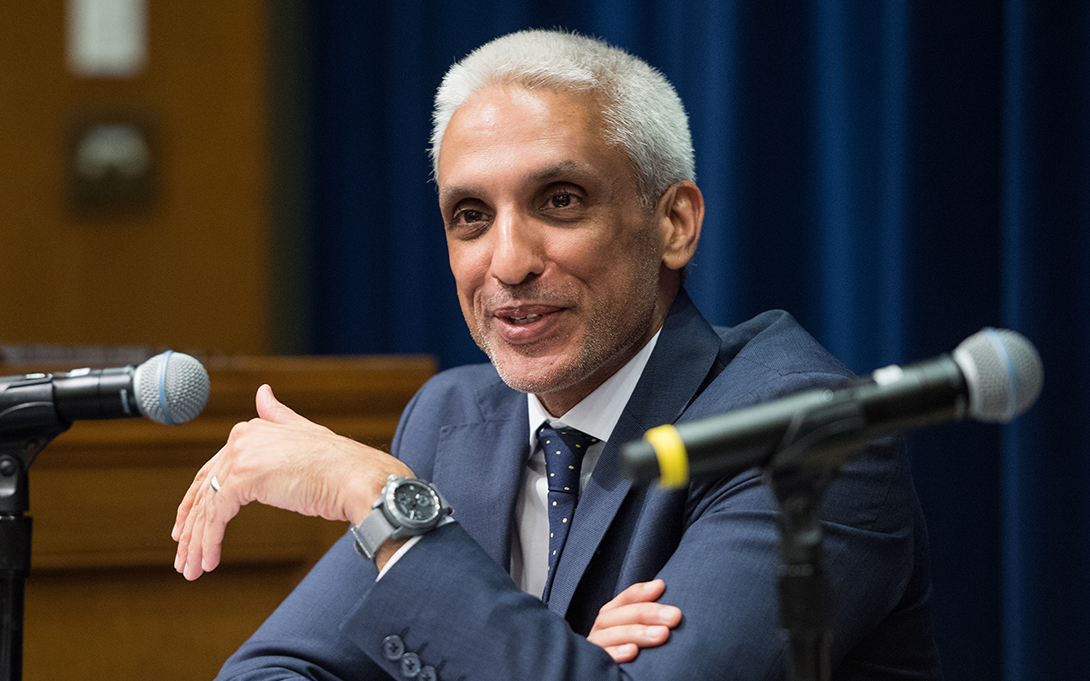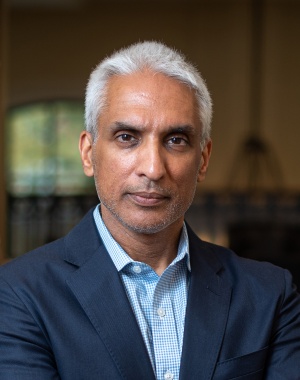
Towsley Policymaker in Residence Javed Ali has been sought-after by news outlets around the world for his expertise in the wake of the attack on the Capitol.
Excerpts
While the purge disrupted communication among extremist groups, experts say it has not silenced them.
“The platform is gone but it doesn’t mean there aren't other platforms out there,” said Javed Ali, a former senior intelligence analyst at the FBI, who is now a fellow at the New America International Security Programme.
In the days after the Capitol Hill riots, lesser-known online platforms, including Gab, and encrypted messaging apps such as Telegram, recorded huge surges in new users.
There is concern among many experts that forcing extremist groups off internet platforms could make them go even farther underground.
“Maybe the consequence of taking down a site like Parler is that it goes back to more the classic world of terrorism communication, where it’s people doing it face to face, with no electronics," Mr Ali said.
"That’s the best operational tradecraft model. You know everyone who is involved, so you minimise potential of any compromise or penetration from a human informant."
Mr Ali said that as these groups turn to communicating in the flesh, it will be much more difficult for law enforcement to monitor their activities and conversations.
Current and former law enforcement officials said a large chunk of Trump supporters so fervently believe the election was stolen that they are likely to prove to be security risks for months to come. As the assault on the Capitol showed, they said, pro-Trump extremists and loyalists may believe that violence is their only recourse.
Javed Ali, a former senior director for counter-terrorism at the National Security Council, said the attack on the Capitol revealed how many people have become radicalized and are willing to act on those beliefs.
“How many people stormed the Capitol? Thousands? Several hundred?” he said. “There are people who are willing to cross these lines, physically and legally, and have the potential to do serious harm.”
Javed Ali, a former senior director for counterterrorism at the National Security Council, said social media can play a major role in accelerating a person’s path toward extremism. The proliferation of misinformation and propaganda has worsened since the 2016 election, he said.
Ali drew a comparison to the challenge social media companies faced in banning ISIS accounts. The terrorist organization was active on Facebook, Twitter and YouTube before those companies began removing ISIS content around 2014.
“They didn’t have the same sort of internal capabilities to do that on their own, and so it took a few years for the social media companies to scale up to meet that challenge,” Ali said. “Here we are in 2020 and we’ve got a different sort of problems when it comes to that content on their platforms. It’s not a foreign issue, it’s a domestic one.”
Former FBI Senior Intelligence Officer Javed Ali breaks down just how serious a threat of this size is.
"When the FBI sends a message that suggests that there's the potential for this high level of threat or even violence, similar to what occurred last week at the U.S. Capitol,” Ali said. “That's unprecedented."
Ali said a nationwide warning like what the FBI issued serves two main purposes, to prepare law enforcement agencies for what could be on the horizon and…
"To show the people out there who might think that somehow last week set an example for them to do in other places that A, you're not going to be successful, and B, there will be severe costs," Ali said.
“This seems to be as close to those early days after 9/11 that we’ve seen in almost 15, 20 years,” he said, comparing it to the color-coded threat levels.
It is unclear how credible the threats are or what extremist groups may be involved, Ali said. Still, he says states need to prepare now and may need to activate the National Guard.
“I think the message is, the implied implication, is folks have to beef it up,” he said of security. “Whatever the original plan was going to look like prior to last week’s events, the numbers may need to increase by orders. And then it’s a question of local governments where are all these resources going to come from?”
The FBI says it can’t confirm the threat warning but is “focused on identifying, investigating and disrupting individuals that are inciting violence and engaging in criminal activity.”
Ali says was not surprised by the insurrection at the US Capitol. He is worried about what could happen at statehouses across the country in the coming days and weeks.
“We just need a really high level of vigilance,” he said.
“It actually may make it harder for law enforcement going forward,” says Javed Ali, a former senior U.S. government counter-terrorism official, now the Towsley Foundation policymaker in residence at the Ford School of Public Policy at U of M.
Social Media has become an important tool for law enforcement over the years. Right now more than a dozen men are charged in a plot to kidnap governor Whitmer, a plan the FBI says was discovered through social media where “a group of people were discussing a violent overthrow,” according to court documents.
And that’s just one of many examples of social media helping an investigation.
“These are the platforms where more and more threat-related information is occurring and it’s not happening in closed forums or protected and cryptic communications,” Ali said.
“It’s certainly very surprising to hear the FBI, my former employer, released a bulletin like that. I don't think it was done with any ill intent. It was clearly based on either specific information that suggests there are threats in all 50 states or on the abundance of caution that even without that direct, specific, credible threat information that individuals, leaders in literally every state across the country need to do more to get ready between now and the inauguration.
I have a hard time believing they have that specific information suggesting there are 50 plots all the coordinated to occur around the ungracious of every state. I think it's more on the abundance of caution. I cannot speak to it directly. But in terms of measures that can be done between now and then it's clearly a warning that security needs to be ramped up. Both with the National Guard elements and there appears to be news that governor so many states already made that decision to mobilize National Guard units. And beefing up law enforcement security, other homeland security resources as well. Developing a very secure layer of perimeter based security somewhere, so that would happen last week at the capitol cannot happen again. Because you have these rings of security around a very tight guarded target. That's hopefully going to be one of the pieces of the plan as it goes forward.
It has serious consequences. It desecrated this iconic piece of the American national identity. There was physical destruction. Somebody was murdered.
What are the benefits of having an outdoor inauguration, demonstrating to the American public, at the world, our friends, our allies, that we are resilient, strong, can withstand these internal challenges and those potentially are probably all the benefits? On the risk side, I spent most of my career looking at risks, the downside, the cost of the things, and they are significant. In light of what happened last week when we think they are beefing up planes even more. They are adding more layers of security, they are going to try to minimize the risk as best as they can. In this word of national security, counter-terrorism, it's hard to get down to zero. But hopefully with the Biden team is thinking through the pros and cons of these decisions, but they need to, do you get to put down the risk as much as possible.”
Citations
- The National, January 15: Banning right-wing US groups from social sites may have risky consequences
- Los Angeles Times, January 14, A broad cross section of Trump supporters stormed the Capitol, arrests show. Now what?
- MLive, January 14, Extreme rhetoric thrives on alternative social media sites growing after Facebook, Twitter crackdown
- WNEM/MSN, January 12, Groups across state, country prepare for possibility of more violent protests
- Fox 46 Charlotte, January 12, Former FBI official: States should take extremist warning seriously
- WXYZ, January 12, Social media companies taking action to curb violence, but what are the unintended consequences?
- CNN International, January 12, FBI warns of armed protests
